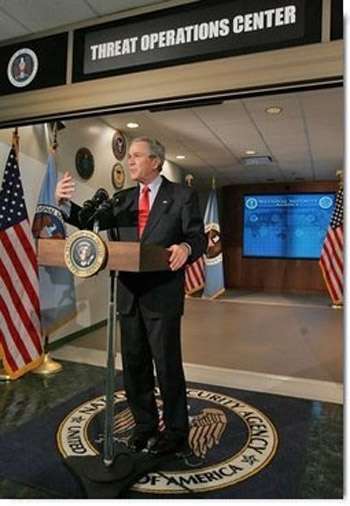NSA Surveillance Watch: NSA’s Telephone Data Collection and Analysis Program – Is It LEGAL?

President Bush Addresses the media after his remarks to employees of the National Security Agency at Fort Meade, Md. , Jan. 25, 2006.
Power Line: Is It Legal?
There has been a lot of discussion about the legality of the NSA’s telephone data collection and analysis program, most of it not very illuminating. I haven’t had an opportunity to form an opinion, and I’m not an expert in telecommunications law. In my quick review of what seems to be the relevant law, I’ve encountered several puzzling provisions. But one section I haven’t yet seen cited, which seems relevant, is Title 18, Chapter 121, Section 2709 of the U.S. Code. It specifically allows the government to obtain telephone records for purposes of investigating terrorist threats. Here is Sec. 2709 in its entirety; I have highlighted some of the pertinent language:
§ 2709. Counterintelligence access to telephone toll and transactional records
(a) Duty to provide.–A wire or electronic communication service provider shall comply with a request for subscriber information and toll billing records information, or electronic communication transactional records in its custody or possession made by the Director of the Federal Bureau of Investigation under subsection (b) of this section.
(b) Required certification.–The Director of the Federal Bureau of Investigation, or his designee in a position not lower than Deputy Assistant Director at Bureau headquarters or a Special Agent in Charge in a Bureau field office designated by the Director, may–
(1) request the name, address, length of service, and local and long distance toll billing records of a person or entity if the Director (or his designee) certifies in writing to the wire or electronic communication service provider to which the request is made that the name, address, length of service, and toll billing records sought are relevant to an authorized investigation to protect against international terrorism or clandestine intelligence activities, provided that such an investigation of a United States person is not conducted solely on the basis of activities protected by the first amendment to the Constitution of the United States; and
(2) request the name, address, and length of service of a person or entity if the Director (or his designee) certifies in writing to the wire or electronic communication service provider to which the request is made that the information sought is relevant to an authorized investigation to protect against international terrorism or clandestine intelligence activities, provided that such an investigation of a United States person is not conducted solely upon the basis of activities protected by the first amendment to the Constitution of the United States.
(c) Prohibition of certain disclosure.–No wire or electronic communication service provider, or officer, employee, or agent thereof, shall disclose to any person that the Federal Bureau of Investigation has sought or obtained access to information or records under this section.
(d) Dissemination by bureau.–The Federal Bureau of Investigation may disseminate information and records obtained under this section only as provided in guidelines approved by the Attorney General for foreign intelligence collection and foreign counterintelligence investigations conducted by the Federal Bureau of Investigation, and, with respect to dissemination to an agency of the United States, only if such information is clearly relevant to the authorized responsibilities of such agency.
(e) Requirement that certain congressional bodies be informed.–On a semiannual basis the Director of the Federal Bureau of Investigation shall fully inform the Permanent Select Committee on Intelligence of the House of Representatives and the Select Committee on Intelligence of the Senate, and the Committee on the Judiciary of the House of Representatives and the Committee on the Judiciary of the Senate, concerning all requests made under subsection (b) of this section.
So there is no question about the fact that the federal government can obtain anyone’s telephone billing records simply by requesting them, if they are relevant to a terrorism investigation, and the telecom companies “shall comply” with such requests. Under this section, the FBI can pass the phone records on to another government agency, like the NSA, if the information is relevant to that agency’s duties.
Flap doesn’t know if this is the code section that government attorney’s used in their memorandum authorizing the program. Nor, does Flap know if any blanket government request would be permissable under the act. However, it does appear the government has broad powers to ascertain this telephone information if it is relevant to a terrorism investigation.
Now, Senator Specter, will you continue to assist on Senate Judiciary Committee Hearings?
Doubtful…..
Stay tuned as more Bush haters try to drudge up more civil libertarian nonsense to discredit the President and the NSA.
Stay tuned…….

Discuss this blog post and MORE…. at the FullosseousFlap’s Dental Blogs, My Dental Forum.
Previous:
NSA Surveillance Watch: NSA Has Massive Database of Americans’ Phone Calls
NSA Surveillance Watch: Senate Intelligence Committee Decides NOT to Pursue Investigation
NSA Surveillance Watch: Congressional Probe of NSA Surveilance Is in Doubt
NSA Surveillance Watch: Specter Skeptical of Domestic Spy Program
NSA Surveillance Leak Case Watch: Attorney General Alberto Gonzales to Testify
NSA Surveillance Watch: AP Poll- Most Say U.S. Needs Warrant to Snoop? – RECYCLED
NSA Surveillance Leak Case Watch: Vice President Cheney Strongly Defends Eavesdropping Operation
Cox & Forkum: One Man’s Whistleblower
Global War on Terror Watch: Why the NSA Monitors Communications of Al-Qaida
NSA Surveillance Leak Case Watch: President Bush Defends NSA Surveillance
NSA Leak Case Watch: New York Times’ Reporter James Risen
NSA Leak Case Watch: Justice Deptartment Probing Domestic Spying Leak
NSA Surveillance Watch: President Had Legal Authority to OK Taps
NSA Surveillance Watch: Calls for Congressional Hearings
Technorati Tags: NationalSecurityAgency, NSA, AssociatedPress, NSASurveillance, NSALeakCase, NewYorkTimes, RasmussenPoll, ArlenSpecter
One Comment
Pingback: